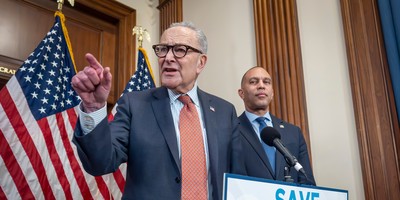Our species has a number of formal names in the scientific-sounding Latin. Perhaps the most ironic is Homo sapiens, man the thinker. Especially when you keep coming across thoughtless statements in the news.
But man does use thought -- to rationalize his actions, however dubious. Some of those rationales are ingenious indeed. Even when admitting past wrongs, it is an almost irresistible temptation to add, "but...." As in "I'm sorry, but...." Which is what makes someone who simply confesses and stops there so rare -- and admirable.
All of which brings me to a now almost forgotten name that popped up in the obituary columns the other day:
Richard H. Poff, who died at the ripe old age of 87, was a highly respected lawyer, a B-24 pilot who flew 35 missions during the Second World War and earned the Distinguished Flying Cross, and an adroit politician. He served almost 20 years in Congress -- and at one point Richard Nixon floated his name for the U.S. Supreme Court.
As part of his Southern Strategy, Mr. Nixon was looking for still another nominee for the high court who hailed from below the Mason-Dixon line. His first two such nominations, Clement F. Haynsworth Jr. and G. Harrold Carswell, hadn't survived scrutiny in the Senate.
As it turned out that Mr. Poff, too, would have had a lot of explaining to do at his confirmation hearing, specifically about his seggish past. In the end he withdrew his name from consideration -- and would go on to a distinguished career as a justice on Virginia's state Supreme Court.
To save his seat in Congress, Richard Harding Poff had signed the infamous Southern Manifesto of 1956 calling for resistance to the law of the land, and he'd gone on to vote against every landmark civil rights bill of the 1960s. An honorable man, he'd done some mighty dishonorable things -- for no better reason than political opportunism.
The gentleman did retain sufficient honor to admit it years later -- in a candid interview that was taped, transcribed and widely circulated at the time. It should be preserved as proof that at least one signer of the Southern Manifesto knew very well what he was doing, and why. As he would confess with typical eloquence:
"I can only say that segregation is wrong today, it was wrong yesterday. Segregation was never right. But it is one of the most lamentable frailties of mankind that when one's wrong is most grievous, his self-justification is most passionate, perhaps in the pitiful hope that the fervor of his self-defense will somehow prove him right. But this doesn't make it so. And he doesn't fool himself."
Or anybody else. Except maybe his fellow rationalizers. Here in Arkansas, the name J. William Fulbright, whose indelible signature still adorns the Southern Manifesto, is much invoked as a model of the intellectual in politics. After all, he was president of the University of Arkansas early in his career, and the College of Arts and Sciences at the university bears his name.
Sen. Fulbright always had the most high-toned excuses for his bargains with racism. Like the need to preserve his long and beneficent influence on American foreign policy. He was the longest-serving chairman of the Senate Foreign Relations Committee (1959-74) in its history. In order to protect his seniority, he had to win election and re-election, didn't he? And to do that, he had to appease the prejudices of voters back home during the Jim Crow era.
The problem with that rationale is that his foreign policy, too, was all too comfortable accommodating evil. Considering his record on or rather against civil rights, it should have come as no surprise when he joined Henry Kissinger as a prominent advocate of detente with the Evil Empire itself. He'd long appeased evil at home. Why not abroad? He'd had a lot of experience at it.
Maybe that's why the name Richard H. Poff caught the eye when it appeared in the obituary column -- like a ray of light from a cloudy past. Despite all the moral compromises he had lent himself to in the bad old days, in the end he made no excuses for them, or for himself. Confession is good for the soul. It cleanses in a way rationalization can never do.
The Man Who Told the Truth -- About Himself
The opinions expressed by columnists are their own and do not necessarily represent the views of Townhall.com.

Advertisement
Recommended
Trending on Townhall Videos
Advertisement
Advertisement
Advertisement
























Join the conversation as a VIP Member